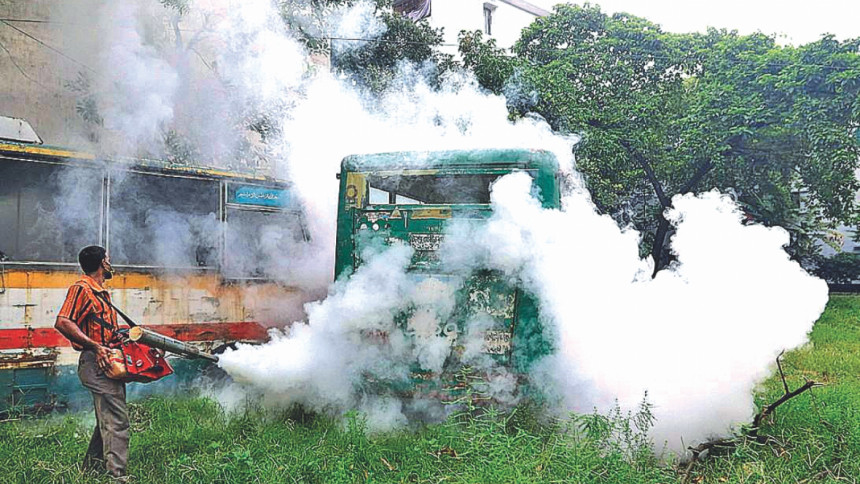Mission Impossible: Dengue control

The death toll from dengue has broken all previous records. The Dhaka North City Corporation (DNCC) and Dhaka South City Corporation (DSCC) had a budget of nearly 47 crores of taka for the control and surveillance of mosquitoes in the last fiscal year. It's unclear, however, why the responsible authorities could not use this budget to implement a well-planned approach to prevent what has now become a full-blown epidemic.
Let's take a look at how the city corporations actually use the budget for preventing mosquitoes throughout the year. SM Monirul Islam, DSCC mosquito supervisor for wards 18 and 19, said that their staff basically spray insecticides on sewer drains, roadside water bodies or other water sources by fogging them. This, however, can only kill the Culex mosquitoes, not Aedes, which are responsible for the dengue virus.

Aedes mosquitoes usually lay eggs in water-filled containers, bowls, tires or vases inside and around our houses, according to experts and multiple research. According to city corporation officials, when mosquito-borne diseases like dengue increase, they are supposed to create teams in every ward for door-to-door inspections to create awareness and kill the larvae. However, the chief health officer of DNCC, Brig Gen Md Moninur Rahman Mamun, admits that they don't have the manpower to carry out door-to-door inspections all year round.
In the absence of comprehensive awareness programmes, a large number of people throw plastic packets, polyethylene, used diapers and tissues from their windows, which create pockets for mosquitoes to breed after rain. Households often use small pipes to drain water from their air conditioners, which can become an ideal source for breeding Aedes mosquitos, when the simple solution of buying a large pipe and attaching it to the sewer line could easily minimise the risk.
Ayesha Akter, an inhabitant of Kazipara, Mirpur, said she had to stop opening the windows of her one-storey home, as people living in adjoining high-rise apartments litter from their windows.
"We clean the premises, balconies and the window sills off and on, as my two-year-old son plays on the premises. We even talked to the nearby landlords and complained several times, but it didn't work. My husband needs to clean the corrugated tin roof once a month because my whole house is a sanctuary for mosquitoes," she said. "People living in luxurious apartments may be richer or more educated than us, but they don't have a minimum sense of waste management," she said.
In fact, the city corporation inspection teams also point that they need to go to the same house two to three times to check whether the source of larvae has been destroyed. There are, of course, laws through which a citizen can be punished for irresponsible actions that can cause harm to public health. For example, according to section 26 and 27 of the fifth schedule of the Local Government Act (City Corporation Act) 2009, if someone doesn't abide by the instructions of the city corporations to cover, remove, repair or clean the toilets, sewage and water waste, or if a landowner fails to remove or clear any shrubs that are a threat to the public health, it is a criminal offence. And for such offences, one will be fined up to Tk 5, 000. If someone continuously commits such offence, he or she will be fined up to an additional Tk 500 for every subsequent day.

The section 17, 18 and 25 of the Communicable Diseases Act 2018 also mentions that the officials of the DGHS can inspect, sterilise or destroy (if needed) any establishment and punish the person responsible for this with a maximum three months of imprisonment or to a fine of up to Tk 50, 000 or both. In addition to that, according to section 24 (1) and (2), if a person helps spread the infectious germs, he or she shall be punished with a maximum six months of imprisonment, a fine up to Tk 1 lakh, or both.
The body in charge of implementation of these laws as per the act is the Directorate General of Health Services (DGHS). However, according to Dr Sanya Tahmina Jhora, director of disease control at DGHS, the DGHS is not involved with the monitoring and enforcement of this law.
On the other hand, executive magistrate Irfan Ahmed of DSCC said that they have started inspecting the buildings under construction and fining people, should larvae be found. He alone visited 40 such buildings, 10 of which were found with Aedes mosquito larvae.
Entomologist Professor Kabirul Bashar from the Department of Zoology, the only mosquito expert of the country, argues we need a four-pronged approach to resolve the ongoing crisis.
"The first thing we need is environmental management. We need a separate team in every ward who will go door to door to identify and examine and destroy the larvae. The team must carry out inspections throughout the year, not just during the crisis period. The team should be equipped with trained personnel, but sadly we don't have any. In fact, the field employees of city corporations, who are given the tasks to spray insecticides can hardly differentiate the larvae of an Aedes mosquito and that of a Culex," he said.
"The second option is to use biological control—that is, introduce bacteria or insects that prey on Aedes larvae. The third option can be spray insecticides or fogging, but it will only be applicable for adult flying mosquitoes. The fourth technique is community engagement, where everyone in the area will assist each other through meeting and campaigns and destroying larvae," he added.
If we also analyse Kolkata's method of combatting dengue, the Kolkata City Corporation conducts intensive surveillance throughout the year, so that water is not stored anywhere. When even a few years ago, Kolkata faced the similar situation, today it is a model for controlling dengue. Now, they have a team consisting of around 25 workers, one of whom runs the campaign, and the other team monitors whether the water is stored anywhere or not. In addition to that, they have rapid action teams, equipment and cars, so that they can destroy the Aedes mosquito larvae, after getting information from the citizen. Since it is nearly impossible for the city corporations to inspect every house in such a short time, concerned citizens believe that a quick complaint mechanism can help the magistrates make spot visits and fine the irresponsible citizens. According to DNCC chief health officer, the citizens can call the helpline 333 to report such incidents. He also assures that he even would not mind receiving a call from the citizens if they want to inform about the presence of larvae in anyone's house. On the other hand, Ahmed said, people can inform such information to the local counselors or the regional executive officer.


 For all latest news, follow The Daily Star's Google News channel.
For all latest news, follow The Daily Star's Google News channel. 



Comments